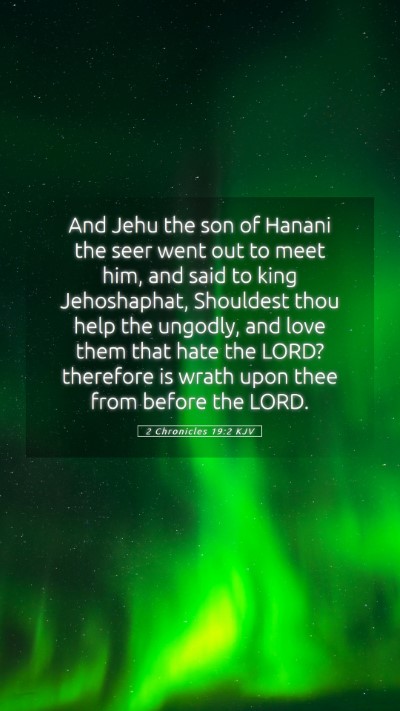Understanding 2 Chronicles 19:2: A Comprehensive Commentary
"And Jehu the son of Hanani the seer went out to meet him, and said to king Jehoshaphat, Shouldest thou help the ungodly, and love them that hate the LORD? therefore is wrath upon thee from before the LORD." - 2 Chronicles 19:2
Bible Verse Meanings
The verse addresses a critical moment where Jehu, a seer, confronts King Jehoshaphat. This
meeting serves as a divine warning against alliances with those who oppose God. The meaning
encapsulates the broader theme of the consequences of compromising faith.
Bible Verse Interpretations
Various biblical scholars provide insights that reveal Jehu's stern message highlights
God's disapproval of unholy alliances. It suggests that
Jehoshaphat's actions, in assisting Ahab, demonstrated a betrayal of
divine loyalty, resulting in impending judgment.
Bible Study Insights
- Historical Context: Jehoshaphat's alliance with Ahab raised concerns about the
spiritual integrity of Israel's leadership.
- Prophetic Role: Jehu, as a prophet, fulfills his duty by calling the king
to repentance.
- Divine Judgment: The mention of "wrath upon thee" signifies that God
holds leaders accountable for their actions.
Scripture Analysis
Biblical exegesis of 2 Chronicles 19:2 reveals the themes of accountability, moral integrity,
and the consequences of forsaking God's commandments.
Matthew Henry emphasizes that Jehoshaphat's love for Ahab stemmed from a
misguided sense of affection rather than a commitment to God. Albert Barnes
elaborates on the importance of discerning true alliances and how they reflect one's
relationship with God.
Key Themes
- The Danger of Compromise: Jehoshaphat's choice to ally with Ahab serves as a
warning against making spiritual compromises.
- Importance of Prophetic Correction: God uses prophets to redirect His people
toward righteousness.
- The Nature of God's Wrath: The phrase "wrath upon thee" emphasizes God's
justice and the seriousness of sin.
Application of Bible Verse to Daily Life
This verse encourages believers to evaluate their associations and decisions through the
lens of scripture. Just as Jehoshaphat faced consequences for his choices, modern
readers are urged to consider how their relationships may affect their walk with God.
Cross References
This verse relates to several key passages, including:
- 2 Chronicles 18:1 - The initial alliance with Ahab.
- 2 Chronicles 20:37 - The prophecy against Jehoshaphat’s alliances.
- James 4:4 - A biblical warning against friendship with the world.
Conclusion
In conclusion, 2 Chronicles 19:2 serves as a poignant reminder
of the importance of maintaining spiritual integrity and the
implications of our choices in alliance with others. Numerous
biblical commentaries provide a rich framework to understand
this passage, emphasizing the need for discernment in our
interactions and an unwavering commitment to God's ways.
For those engaged in Bible study groups, this verse can serve as
a topic for discussion on the nature of godly and ungodly
associations. Online Bible study resources also offer
valuable insights into the ramifications of such alliances
throughout scripture.


